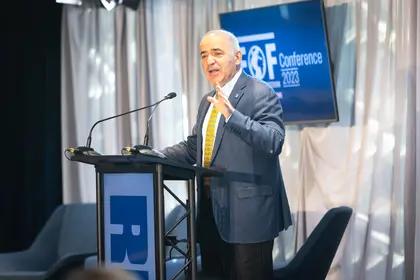Garry Kasparov, exiled Russian dissident and pro-active anti-authoritarian, plans to take on dictators he says are only advancing due to Western democracies’ inarticulation and inaction over the last few decades. Kasparov says the fight for democracy’s survival is going on in the crucible of Russia’s war in Ukraine.
Entering the Front Lines of Freedom Conference, hosted by the Renew Democracy Initiative (RDI), an organization that Garry Kasparov chairs, he is perturbed by what he sees transpiring in Ukraine and the Middle East, events that he thinks are the logical consequence of Western inaction to authoritarian regimes which have routinely blown through the West’s supposed “red lines.”
JOIN US ON TELEGRAM
Follow our coverage of the war on the @Kyivpost_official.
Following the release of Kasparov’s 2015 book, Winter is Coming, Kasparov was a lone voice, warning that the West’s muddled and insufficient response to Russian President Vladimir Putin’s 2014 invasion of Ukraine, would be interpreted by the Kremlin as a sign of weakness and indifference, thus guaranteeing a future attempt by the autocrat to sack his neighbor.
The world did not heed Kasparov’s message and as a result, “Iran now threatens America, not in the Middle East, but in New York. There is a war against the world order,” the consequence of the West “fearing these dictatorships rather than standing-up to them.”

Putin and Xi Praise Ties, Hours After Trump Sworn In
“Today, we see there is a plan,” says Kasparov.
“Always listen to dictators: They lie about what they have done, but often tell you what they are planning to do. Hitler wrote a blueprint: Mein Kampf. It was clear what he planned to do.
“Putin, in 2005, was already a dictator. He made clear what he intended to do. But no one paid attention to it.”
However, he argues, the world has not learned its lesson – today the world is repeating its errors, something that adds urgency to Kasparov’s work with RDI.
The organization’s goal is to “expose and confront the international alliance of dictators, and in so doing, aim to inspire people in the US and other free countries to value and defend their own democracies,” explained Uriel Epshtein, CEO of RDI.
By uniting democratic and human rights leaders from around the globe, RDI is giving those who fight for open and free democracy the tools they need to succeed. Over the last year and a half, much of that support has been focused on Ukraine, which Epshtein says has become the literal front line in the global fight against authoritarianism.
RDI has raised and delivered over $10 million in support of Ukraine and continues to work on uniting the forces of freedom in defense of Ukraine’s freedom.
Epshtein, the son of Soviet dissidents, is a pillar of the global democracy movement who is pressing Americans to wake-up to the fact that the powers pushing back on democracy are a threat not just in far-off nations, but even in America, where citizens often take their own freedom for granted.
Evan Mawarie, Director of Front Lines for Freedom, highlighted how the fight for freedom and democracy is universal, whether in his own case where he was forced to flee his native Zimbabwe for founding an organization to confront the poverty, injustice, and corruption produced by the Robert Mugabe regime, or in Latin America, Asia, or within Russia.
Throughout the event, dissidents highlighted how authoritarian repression wasn’t limited only to their own oppressive countries but managed to make its way into free societies.
Enes Kanter Freedom, a professional basketball player for the Boston Celtics, recounted how learning of the gang-rape of Uyghur women, forced sterilizations and abortions, and torture forever changed his life.
This experience led him to visibly supporting the persecuted Muslim Uighurs of China at some of his NBA games. As a result, his team’s games were banned from China and Enes found himself pushed out of the League.
Even more concerningly, credible death threats have become a normal part of life for many dissidents. The Federal Bureau of Investigation (FBI) takes these threats seriously and does everything it can to protect people on American soil, but the disruption to the lives of dissidents is real.
A Cambodian Buddhist monk, dressed in bright orange, nods his head in agreement as a Nicaraguan dissident cites his own, recent, emigration to the United States. Upon arriving in America, he learned that he and his colleagues' assets had been nationalized and that their Nicaraguan citizenship had been stripped.
With the influx of tyranny, RDI works around-the-clock to support people who have invested their lives in fighting for freedom. Many of those in attendance, nearly all exiles banished from their homelands, have lost friends and family to the violent silencing of dissidents across the world.
To Kasparov, the situation is clear: “The fight for democracy starts at home. Giving-in to tyrants and thugs, elsewhere in the world, has effects on us, here in America.”
Known as the greatest chess player in history, Kasparov ends his speech with a chilling reminder: “The fight against authoritarianism is like a game of chess: it’s black or white, but this is not like chess. There is no draw. You win or you lose.
“We have a historic responsibility. History will not forgive us if we do not act now.”
You can also highlight the text and press Ctrl + Enter










